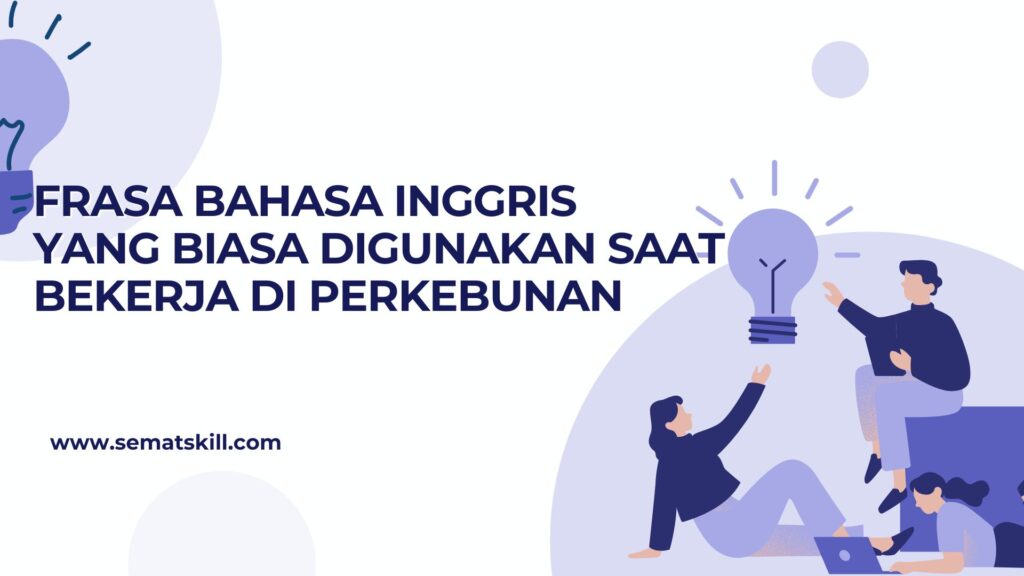Bekerja di perkebunan memerlukan pemahaman yang baik tentang berbagai istilah dan frasa yang digunakan dalam aktivitas sehari-hari. Bagi pekerja perkebunan yang berinteraksi dengan supervisor atau rekan kerja asing, kemampuan berkomunikasi dalam bahasa Inggris adalah keterampilan yang sangat bermanfaat. Artikel ini akan membahas berbagai frasa bahasa Inggris yang biasa digunakan saat bekerja di perkebunan, lengkap dengan penjelasan dalam bahasa Indonesia, contoh kosa kata, percakapan, dan latihan soal.


Kosa Kata Umum di Perkebunan
- Harvest – Panen
- Contoh: “We will start the harvest next week.”
- Plantation – Perkebunan
- Contoh: “This plantation grows various types of crops.”
- Crops – Tanaman
- Contoh: “The crops are ready to be harvested.”
- Irrigation – Irigasi
- Contoh: “Proper irrigation is crucial for healthy crops.”
- Fertilizer – Pupuk
- Contoh: “We need to apply fertilizer to the soil.”
- Pesticide – Pestisida
- Contoh: “Pesticides are used to protect the crops from insects.”
- Seedlings – Bibit tanaman
- Contoh: “We have planted the seedlings in the nursery.”
- Weeding – Penyiangan
- Contoh: “Weeding is necessary to remove unwanted plants.”
- Pruning – Pemangkasan
- Contoh: “Pruning helps to maintain the health of the plants.”
- Yield – Hasil panen
- Contoh: “This year’s yield is expected to be higher than last year.”
Frasa Umum dan Penjelasannya
- “How can I help you?” – “Bagaimana saya bisa membantu Anda?”
Frasa ini digunakan untuk menawarkan bantuan kepada supervisor atau rekan kerja. - “We need to water the crops.” – “Kita perlu menyiram tanaman.”
Digunakan untuk menyatakan kebutuhan untuk menyiram tanaman. - “The soil needs more fertilizer.” – “Tanah membutuhkan lebih banyak pupuk.”
Digunakan untuk menyatakan bahwa tanah membutuhkan tambahan pupuk. - “Please check the irrigation system.” – “Silakan periksa sistem irigasi.”
Digunakan untuk meminta seseorang memeriksa sistem irigasi. - “The harvest will begin next week.” – “Panen akan dimulai minggu depan.”
Digunakan untuk memberitahukan jadwal panen.
Contoh Percakapan


Supervisor dan Pekerja
Supervisor: “Good morning! How are the crops today?”
Pekerja: “Good morning. The crops are doing well, but they need more water.”
Supervisor: “Alright. Please make sure the irrigation system is working properly.”
Pekerja: “I will check it right away.”
Saat Memeriksa Tanaman
Pekerja 1: “Have you applied the fertilizer to this area?”
Pekerja 2: “Not yet. I will do it after we finish weeding.”
Pekerja 1: “Great. We need to ensure the soil is rich in nutrients.”
Latihan Soal
Soal 1: Pilih jawaban yang benar untuk melengkapi percakapan berikut.
- Supervisor: “Good afternoon! _?”
- a. How are you
- b. How can I help you
- c. How are the crops
- Pekerja: “Can you tell me if the irrigation system is working?”
Supervisor: “Sure, I will __.”
- a. check it
- b. water the crops
- c. plant the seedlings
- Pekerja: “We need to apply more fertilizer.”
Supervisor: “__.”
- a. That’s not necessary
- b. Go ahead and do it
- c. Both a and b
Jawaban:
- c. How are the crops
- a. check it
- b. Go ahead and do it
Soal 2: Terjemahkan kalimat berikut ke dalam bahasa Inggris.
- “Bagaimana saya bisa membantu Anda?”
- “Kita perlu menyiram tanaman.”
- “Panen akan dimulai minggu depan.”
Jawaban:
- “How can I help you?”
- “We need to water the crops.”
- “The harvest will begin next week.”
Penutup
Kemampuan menggunakan frasa bahasa Inggris di perkebunan dapat meningkatkan efektivitas komunikasi antara pekerja dan supervisor, serta meningkatkan efisiensi kerja. Dengan memahami dan menggunakan kosa kata serta frasa yang tepat, pekerja perkebunan dapat memberikan kontribusi yang lebih baik dalam kegiatan sehari-hari. Latihan soal yang disediakan dapat membantu memperkuat pemahaman dan kemampuan berbahasa Inggris dalam konteks ini. Selamat belajar!

